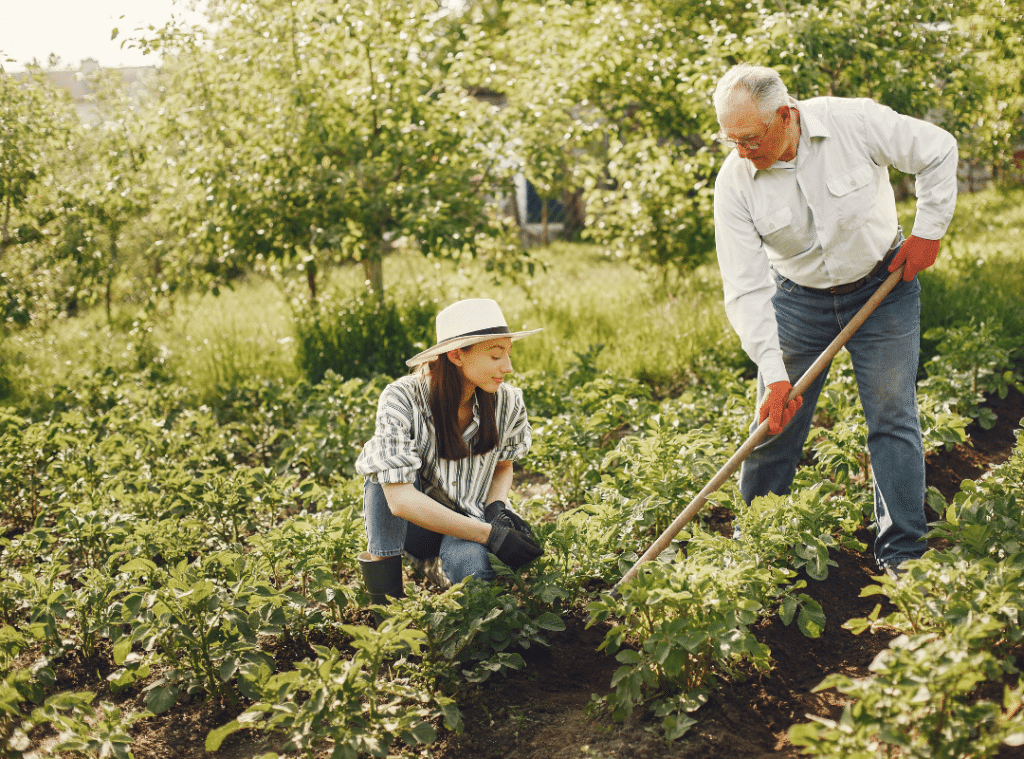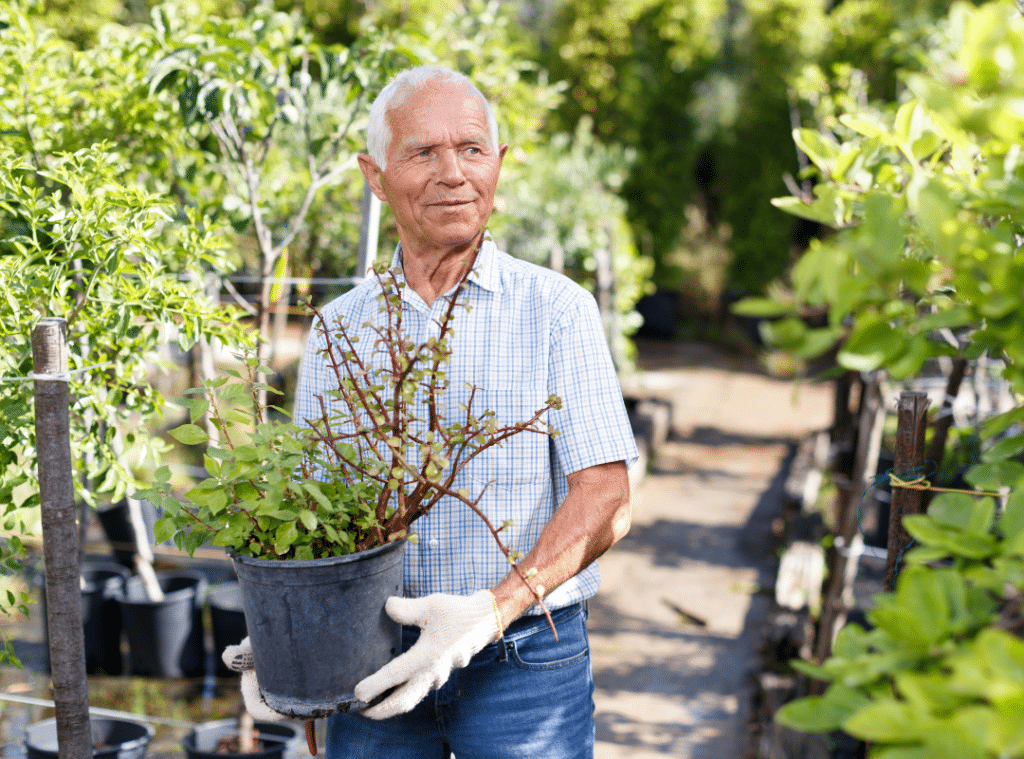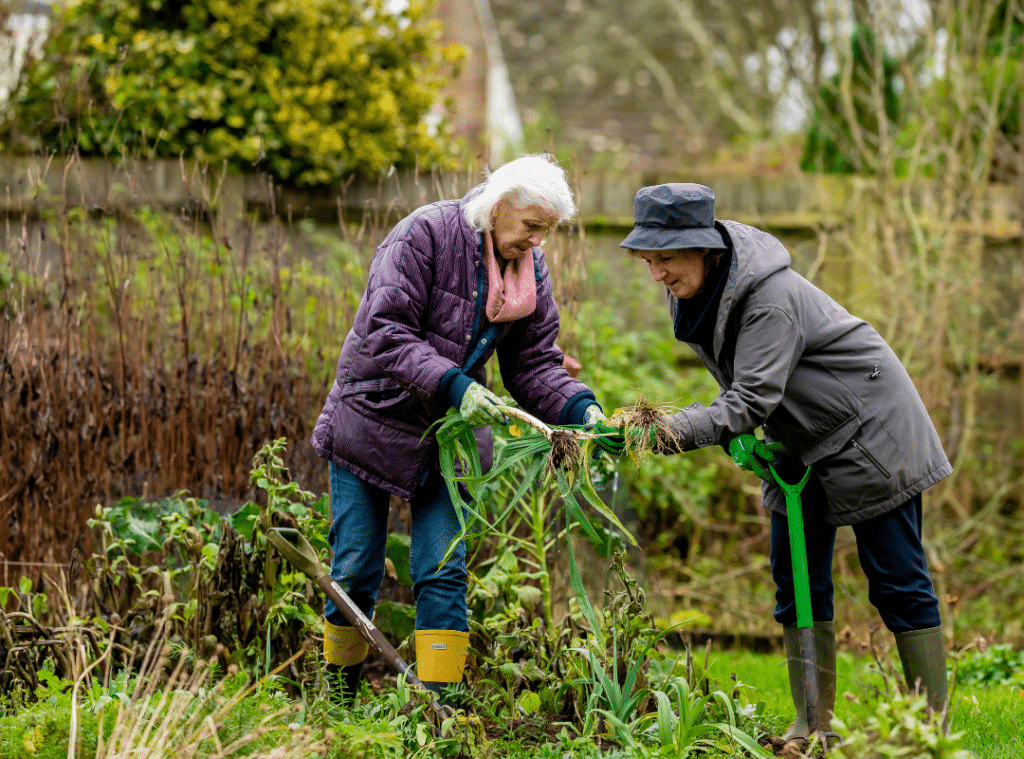Elderly people gardening is more than just a relaxing pastime—it’s a powerful way to promote wellness, physical activity, and social engagement. At Westmont Village Homes, we believe that gardening offers countless benefits for seniors, from enhancing mental health to building community connections. Whether you’re new to gardening or returning to it after a break, there are plenty of ways to make this activity safe, fun, and fulfilling.
With the right tools, planning, and support, elderly people gardening can flourish into a rewarding part of daily life. From raised beds to lightweight tools, every aspect can be customized to meet your needs. Read on for expert tips, creative ideas, and inspiration to help you start or enhance your gardening journey.
Westmont Village Homes offers a welcoming environment where seniors can enjoy gardening and other enriching activities every day.
Benefits of Gardening for Seniors
Gardening brings more than beauty to your yard—it brings vitality to your life. Elderly people gardening see improved mental and physical well-being through this nature-focused activity. It reduces stress, enhances mood, and sharpens cognitive functions. Gardening also boosts creativity and encourages strategic thinking, especially when planning which plants to grow.
Participation in gardening fosters a sense of accomplishment, especially as you nurture your plants from seed to bloom. It also promotes social interaction—sharing harvests, joining gardening clubs, or simply chatting with neighbors. Gardening even pairs well with other activities like classic board games for cognitive stimulation.
Choosing the Right Tools and Creating Accessible Garden Spaces
To make elderly people gardening comfortable and accessible for elderly people, choosing the right setup is essential. Start with elderly gardening tools designed to reduce physical strain—look for lightweight, ergonomic handles and cushioned grips. These tools help avoid fatigue and minimize pressure on joints.
Consider installing raised beds to eliminate the need to bend or kneel. This setup is perfect for seniors with mobility challenges. Make garden paths wide and smooth, accommodating walkers or wheelchairs, and add benches or shaded resting areas throughout. These modifications can enhance your gardening time and allow for longer, more enjoyable sessions.
As highlighted in our article on social dining experiences, socializing while gardening amplifies the benefits and keeps you connected to your community.
Safety Tips for Elderly Gardeners
Safety is the foundation of successful gardening for seniors. Prioritize comfort and stability with tools like padded kneelers, gloves with grip support, and elderly gardening tools designed for aging hands. Stay hydrated and take breaks in shaded areas to avoid fatigue or heat exhaustion.
Keep garden areas free from clutter and obstacles to prevent tripping. Install handrails near raised beds or along walkways for extra balance. A wide-brimmed hat, sunglasses, and sunscreen will protect you from the sun.
Gardening also contributes to emotional well-being. As discussed in our article about senior companions, nurturing your environment can bring deep satisfaction and a sense of purpose.
Engaging in Light Gardening Activities
Not all gardening has to be intensive. There are plenty of elderly people gardening ideas for elderly people focused on light, enjoyable activities. Container gardening, for instance, is a low-effort way to grow herbs, flowers, or vegetables. Indoor plants like succulents, peace lilies, or pothos are great options—they require minimal upkeep and brighten your home.
Set a gentle watering schedule and use elderly gardening tools like watering wands or long-handled trowels. Ask friends or family to help with heavier lifting or digging. Gardening can also become a tech-savvy hobby—smart watering systems and reminder apps are great examples of technology for elderly care that make gardening more manageable and fun.
Gardening Plants Perfect for Seniors
Choosing the right plants is a big part of elderly people’s gardening. Focus on low-maintenance and rewarding options. Popular elderly people gardening plants include:
- Herbs like basil, mint, and rosemary
- Vegetables like lettuce, radishes, and cherry tomatoes
- Flowers like marigolds, petunias, and pansies
These plants are easy to grow, require minimal pruning, and thrive in containers or raised beds. Avoid plants with thorns or those that require extensive care, and instead, choose varieties that encourage daily enjoyment and beauty.
Looking for more inspiration? Visit Gardeners’ World for expert tips and senior-friendly plant suggestions.
When and How to Seek Help
Knowing when to seek help can make elderly people gardening more enjoyable and safer. There’s no shame in asking for a hand, whether it’s lifting a heavy pot or pruning a tall bush.
- Ask family or neighbors to help move soil bags or tools.
- Join local gardening groups for camaraderie and assistance.
- Utilize community resources, such as senior centers, that provide shared gardening supplies for elderly individuals.
Gardening with others also builds deeper bonds and fosters a sense of purpose. Learn more about how gardening supports meaningful senior relationships.
Establishing a Gardening Routine
A solid routine helps make gardening a reliable part of your life. Structure your tasks based on your energy levels and the season. Mornings may be best for watering or weeding when it’s cooler. Save more demanding tasks for when you feel strongest.
Here’s a sample weekly plan:
- Monday: Watering and fertilizing
- Wednesday: Light pruning or deadheading flowers
- Friday: Harvesting or replanting
The routine can be flexible but should focus on steady, low-stress activities. Using your favorite elderly people’s gardening supplies, you can create a nurturing space that fits seamlessly into your lifestyle.
Building a Gardening Community
Gardening is more fun when shared with others. Local clubs and community gardens offer a wonderful outlet for connection and creativity. Hosting garden days or plant swaps can create beautiful moments of friendship and purpose.
Here are a few ways to get involved:
- Volunteer at a local senior garden
- Attend workshops or online classes
- Share tips and successes in social media gardening groups
If you’re looking for community inspiration, check out The American Horticultural Society for events and programs designed for senior gardeners.

Creative Gardening Ideas for Elderly People
Try these fun and adaptive elderly people gardening ideas:
- Themed gardens: Create herb spirals or butterfly-friendly flower beds
- Vertical gardens: Perfect for balconies or small patios
- Decorative pots: Add color with painted containers or upcycled materials
These creative concepts ensure gardening is always exciting and aligned with your space, mobility, and interests.
A Community That Supports Your Passion for Gardening
Gardening isn’t just about growing plants—it’s about growing joy, health, and connection. Whether you’re tending to herbs on your windowsill or cultivating a raised garden bed, the right tools, supplies, and support make all the difference.
Westmont Village Homes is dedicated to creating an environment where elderly people can thrive. From community garden plots to supportive neighbors and thoughtful design, our community is built with your passions in mind.
For more information, call us at 951-697-2060 or schedule a tour here. Let’s create beautiful memories together in the garden!
Dive into the vibrant life our Westmont communities have to offer.Find Where You Belong
Frequently Asked Questions
What is the best garden for the elderly?
The best garden for the elderly is one that is accessible, low-maintenance, and safe. Raised garden beds, container gardening, and vertical gardens are excellent choices because they reduce the need for bending or kneeling. Including non-slip pathways, shaded areas, and ergonomic tools can also make gardening more enjoyable and safer. A sensory garden with fragrant flowers and textured plants is especially beneficial for those with dementia or mobility issues.
How will you take care of elderly people?
Caring for elderly people involves meeting their physical, emotional, and social needs with compassion and respect. This includes helping with daily tasks, providing nutritious meals, ensuring regular medical check-ups, and creating a safe living environment. Emotional support is just as crucial—spending time with them, listening, and encouraging hobbies can improve their mental well-being. Personalized care plans that consider their preferences and limitations are essential for effective elder care.
What is the oldest style of gardening?
The oldest style of gardening is believed to be permaculture or forest gardening, which dates back thousands of years. Ancient civilizations like the Mesopotamians, Egyptians, and Chinese practiced early forms of agriculture that mimicked natural ecosystems. These gardens emphasized sustainability, biodiversity, and harmony with nature. Traditional cottage gardens and monastery gardens from the Middle Ages also reflect historic gardening principles still admired today.
How to combat loneliness in elderly people?
Combating loneliness in elderly people starts with regular social interaction, whether through family visits, community programs, or senior groups. Encouraging participation in hobbies, volunteering, or even digital communication can foster meaningful connections. Pet therapy, gardening, and joining clubs tailored for seniors also provide companionship and purpose. Technology like video calls and social apps can help bridge the gap when in-person contact isn’t possible.









